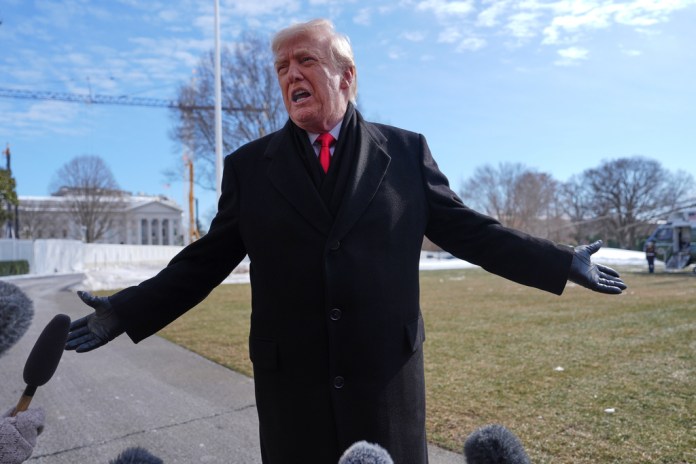Trump battles ‘forum shopping’ amid liberal lawsuit surge – Washington Examiner
President Donald Trump has initiated a directive aimed at curbing what he terms an “anti-democratic takeover” of federal courts, linked to a practice called “forum shopping” by activist groups. This directive instructs federal agencies to enforce Rule 65(c) of the Federal Rules of Civil Procedure, which requires plaintiffs seeking injunctions against government actions to post security for potential costs and damages if they lose their cases.
The White House memo argues that many lawsuits targeting the Trump governance are filed in jurisdictions with liberal judges, leading to “frivolous” legal challenges supported by well-funded nonprofit organizations. Thes cases, it claims, delay the implementation of policies that voters supported. Trump’s administration contends that requiring financial security from plaintiffs will deter bad-faith lawsuits and prevent taxpayers from footing the bill for these legal battles.
The issue of forum shopping has drawn bipartisan criticism, with both conservative and liberal groups accused of strategically filing lawsuits in favorable jurisdictions. as the Supreme Court prepares to rule on related cases,including potential restrictions on nationwide injunctions and venue selection for lawsuits,the Trump administration’s directive reflects a push to reinforce executive power against what it views as politicized judicial challenges.
Trump battles ‘forum shopping’ amid liberal lawsuit surge
President Donald Trump on Thursday moved to address what he called an “anti-democratic takeover” of federal courts through “forum shopping” by activist groups, issuing a directive to executive agencies to demand financial security from plaintiffs who seek out friendly judicial venues to file lawsuits against federal policies.
A new memorandum from the White House instructs federal agencies to enforce Federal Rule of Civil Procedure 65(c), which the Trump administration says requires litigants seeking injunctions against the government to post security for possible costs and damages if their lawsuit fails.
“This anti-democratic takeover is orchestrated by forum-shopping organizations that repeatedly bring meritless suits, used for fundraising and political grandstanding, without any repercussions when they fail,” the memo by the White House reads.
The move comes as nearly 100 lawsuits are targeting Trump administration policies in jurisdictions known for liberal-leaning judges, such as Washington, D.C., California, and Rhode Island.
The memo argues that these legal challenges, often backed by nonprofit groups with deep pockets and left-wing ties, have resulted in “frivolous” injunctions and restraining orders that stall the policies voters elected officials to implement. Administration officials argue that if plaintiffs are forced to cover possible damages when they lose lawsuits, it will deter bad-faith litigation and prevent taxpayer dollars from funding costly court battles.
The issue of forum or “judge shopping” is hardly new, but in recent years it has drawn bipartisan criticism because both conservative and liberal groups have been accused of strategically filing lawsuits in specific districts to achieve favorable outcomes.
Sen. Lindsey Graham (R-SC), a staunch supporter of Trump who sits on the Senate Judiciary Committee, has said it is “axiomatic that judge shopping is discouraged practice,” and has cautioned courts to consider other remedies than delivering nationwide injunctions against a president’s executive policies.
Under the Biden administration, conservative legal organizations were accused by left-wing critics of bringing cases before the Northern District of Texas, a jurisdiction known for fewer judges and a greater number of Trump appointees who some lawyers may see as sympathetic to right-wing legal challenges.
Rule 65(c) is “discretional” for appellate courts, one lawyer told the Washington Examiner, adding that it is not certain that the administration would be successful forcing litigants to pay for legal fees even if they ultimately lose their lawsuits.
However, there is a potential remedy around the corner. The Supreme Court is soon poised to address the controversy of forum shopping and nationwide injunctions in a pair of upcoming cases that could reshape venue selection and the power of lower court judges.
One major case, EPA v. Calumet Shreveport Refining, will determine whether lawsuits challenging the Environmental Protection Agency’s Renewable Fuel Standard program must be heard in the U.S. Court of Appeals for the District of Columbia Circuit or can be filed in a court of appeals where an affected party resides. Justices will hear this argument on March 25, and the eventual ruling could have wide-ranging implications for how regulatory challenges proceed.
Meanwhile, in Garland v. Texas Top Cop Shop, the Justice Department has asked the high court to rein in the authority of lower courts to issue nationwide injunctions, a legal tool frequently used to halt presidential policies across the country.
As the Supreme Court weighs these cases, the Trump administration’s directive signals an aggressive push to curtail liberal-led legal challenges and reinforce executive power.
Justice Samuel Alito, a stalwart conservative justice and appointee of former President George W. Bush, issued a strong and “stunned” dissent on Thursday after the majority of his colleagues declined to halt a lower court judge’s order forcing the administration to fulfill $2 billion in foreign aid contracts that Trump is trying to claw back.
ALITO ‘STUNNED’ AFTER SUPREME COURT REJECTION OF TRUMP FOREIGN AID FREEZE
“Does a single district-court judge who likely lacks jurisdiction have the unchecked power to compel the Government of the United States to pay out (and probably lose forever) 2 billion taxpayer dollars? The answer to that question should be an emphatic ‘No,’” Alito wrote.
The Trump administration memo asserts that improperly granted injunctions “undermine the democratic process” by allowing unelected judges to dictate federal policy. Whether courts will embrace stricter enforcement of Rule 65(c) remains uncertain, but the administration’s position sets the stage for a broader legal battle over judicial power and the limits of forum shopping.
" Conservative News Daily does not always share or support the views and opinions expressed here; they are just those of the writer."



